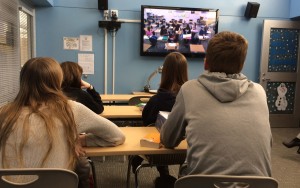Idaho’s high school broadband costs are trending upward — but the local Internet contracts still represent big savings from the defunct Idaho Education Network.

Earlier this year, after a court ruling left the statewide system in mothballs, districts secured short-term broadband service at surprising discounts. By and large, those savings should continue into 2015-16, according to preliminary budget requests obtained by Idaho Education News.
But the cost increases, while slight, raise a question for the future: Are the current savings sustainable? Meanwhile, lawmakers will start meeting next week to discuss whether the state has a role to play in providing high-speed Internet to schools across the state.
The new cost figures
The 2015-16 budget requests are unverified and incomplete. About a dozen districts and charter schools have not yet put in a request. And the State Department of Education hasn’t completed its reviews.
The key numbers:
- So far, districts and charter schools have requested close to $216,000 a month for high-speed Internet.
- In March, after districts and charters scrambled to replace the defunct statewide network, they submitted claims totaling $193,000 a month.
- Both of these figures come in far below the Idaho Education Network costs. In March, the State Department of Education pegged network costs at $731,000 a month.
Based on the preliminary requests, the local broadband projects would appear to fit easily within the state’s budget. The requests for monthly and one-time funding come in at slightly more than $2.6 million. The 2015 Legislature set aside $6.3 million to reimburse broadband costs in 2015-16.
The requests vary widely, from $99.99 a month in Fruitland to $11,739 a month in Lakeland. Some costs are going up: Boise is requesting $3,300 a month, up from $1,163, while St. Maries is asking for $9,307.88, up from $1,933.33. In Fremont County, meanwhile, costs have tumbled from $11,835.75 per month to an $1,100-per-month request this year.
For the State Department of Education, the increases are troubling. If local vendors raise their prices, the state will have to absorb the costs on districts’ behalf — without the cushion that comes through pooling.
“These preliminary requests are not sustainable in the long-run, which points to the statewide solution as the opportunity to support districts while keeping costs low,” said Jeff Church, a spokesman for state superintendent Sherri Ybarra.
More broadband bad news
The preliminary 2015-16 requests comes after a series of troubling revelations about the politics of the broadband fiasco — and the potential costs to taxpayers.
Otter’s role. This week, the Associated Press revealed that Gov. Butch Otter knew about the broadband budget crunch in October 2013, three months before lawmakers and the public knew about it. It wasn’t until Jan. 30, 2014 that then-Administration Department director Teresa Luna acknowledged delays in “e-Rate” funding — federally administered telephone surcharges which had accounted for 75 percent of the network’s budget.
Rising legal costs. A Boise firm has received more than $1 million to mount an unsuccessful legal defense of the network contract. State officials disclosed the rising costs to Idaho Education News this week.
More legal costs? District Judge Patrick Owen has ordered the state to pay more than $930,000 in legal fees to Syringa Networks, the company that successfully sued to overturn the broadband contract. (Idaho Education News wrote first about Owen’s June 30 order.)
Looming lawsuits. The state did not respond to two tort claims from ENA and subcontractor Qwest Communications, seeking at least $6 million in payments put on hold during the legal dispute. The state had 90 days to respond to the tort claims, filed in March. Now that the deadline has passed, ENA and Qwest are free to sue.
Legislators start at ‘ground zero’
Amidst this backdrop — and after two years of legislative bailouts — lawmakers will start taking a fresh look at the broadband issue Tuesday.

A 10-member legislative interim committee will begin the work of sorting out broadband options for schools and state agencies. And lawmakers will begin at “ground zero,” said Rep. Luke Malek, co-chairman of the committee.
“A history lesson is the best starting point for figuring out how to move forward,” Malek said.
Tuesday’s agenda is heavy with overviews. A history of the Idaho Education Network and funding. Broadband presentations from four Idaho school districts. A presentation on e-Rate funding.
Some postmortem is necessary, Malek said. Lawmakers need to take a fresh look at what went wrong with the Idaho Education Network — so they can sort out the problems the stemmed from the illegal contract, and the systemic challenges that would affect any statewide system.
The interim committee’s mission is clear, and it speaks to a question that will await lawmakers when they return to Boise in 2016. What role should state government play in running high-speed Internet to its schools and state buildings?

House Minority Leader John Rusche expects his colleagues on the committee to recommend some sort of middle ground. Larger districts with greater buying power would still be able to go their own way. Smaller districts may be given the option of pooling with neighboring districts and state government satellite offices. Even in smaller towns, he said, schools and state offices would provide the “anchor tenants” that encourage Internet providers to serve a remote community.
Malek isn’t making any predictions. “I’m not going to speculate on what the end conclusion is going to be.”
